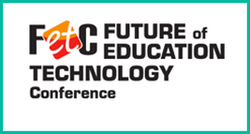FETC 2019 will take place from January 27-30 at the Orange County Convention Center in Orlando, Fla.

The digital games of today are visually appealing, contain immersive stories, and encourage both single and team gameplay. Today’s digital games are products of an incredibly powerful and flexible market that have helped spawn a gaming culture. Today there are roughly 2 billion people in the world that play games - 2 billion people with something in common and that see some sort of benefit for spending hours upon hours engaging in their digital experiences.
Digital games are highly interactive forms of media that put players in control of their own experiences. The subject matter and storylines presented in games are quite diverse; allowing virtually any academic content to be explored or skill to be mastered.
They also provide constant feedback and allow players to learn through both their successes and failures. As gaming evolves, its purpose is changing. Games are no longer considered just an entertaining pastime. A growing body of research is identifying games as compelling tools for modern-day teaching, learning, and assessment.
First, there are tens of thousands of digital learning games available online at this very second. Educators can perform a simple Google search for content-specific games to infuse into their lessons. For instance, imagine a group of science students learning about life cycles. A teacher simply Googles Interactive life cycle games for kids to find hundreds of potential games.
Next, large online collections of browser-based digital learning games exist, which are often referred to as game hubs. These sites house many different types of digital games tailored to specific content areas and ages. Some examples include ABCYa, BrainPOP, PBS Kids, and Prodigy. Another option is Steam - an online-gaming platform that hosts a massive online catalog.
Next, they should play the game and even pilot gameplay with a small group of colleagues or learners to determine if it is the right fit for the intended learning experience.
Finally, educators must consider how they will disseminate the game during the learning experience. Will the experience be at a learning station for one learner at a time? Will it be a whole group game, or will there be teams? The type of game and available resources will determine the best delivery method.
A word of caution—digital games should never be over-utilized in schools. If used too often, they will lose their appeal for both students and teachers. Instead, educational gaming should become another approach for educators to consider adding to their toolbox of teaching strategies—pulled out at the right time.
For more information, strategies, and resource associated with gaming and learning, Game On: Using Digital Games to Transform Teaching, Learning, and Assessment is available at Solution Tree Press or on Amazon.
About the Author:













